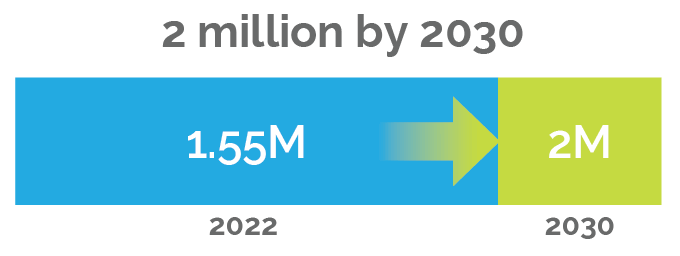RALEIGH (February 6, 2023) – North Carolina’s economy is on a roll. But we’re still 31,000 graduates short of where we need to be to fill the jobs rolling into the state,1 according to a goal state leaders set in 2019.

“When we talk to the CEOs … the three most important issues that they want to talk about are workforce, workforce, and workforce,” Gov. Roy Cooper told attendees Monday at an event sponsored by myFutureNC.
The nonprofit is a coalition of business, education, nonprofit, religious and political leaders that adopted a goal of 2 million North Carolinians ages 25-44 with a college degree or credential by 2030.
Cooper noted dramatic vacancies this year among K-12 teachers, bus drivers and early-childhood instructors. One-quarter of early-education teachers don’t even have health insurance, he said. And the state ranked 34th in teacher pay in 2020-21.2
“We’ve got to make sure that we invest, pay them, and treat them like the professionals they are,” Cooper said. He added that educators must embrace the whole child – including children who don’t know whether they’ll sleep in a safe place from one night to the next.
“We’ve got to have the resources to do it,” he said. “We’ve got to stop with the tax cuts to the wealthy. The math doesn’t add up.
“We need to stop it. We don’t need (tax cuts) for economic growth and development. They are coming – they are coming in droves.”
Business leaders are lobbying the state for investments in both early-childhood education and higher education, an animated Cooper said, “but business leaders know you’ve got to be able to pay for it.”
AFTER ANNOUNCEMENTS from Apple, Google, Toyota, Boom Supersonic and Wolfspeed in the past year,3 employers do indeed seem to be flocking to the state. And the state was ranked No. 1 in the country for its business environment by CNBC last year.4
Yet North Carolina now ranks 50th among the states for the percentage of its GDP it devotes to education.5
And out of 100 of today’s 9th-graders, only 28 will become a college graduate:
“Twenty-eight out of 100 is not nearly enough to meet the 2 million jobs” that will require a credential or degree by 2030, said Cecilia Holden, President and CEO of myFutureNC. “We need 440,000 more people with degrees or credentials to meet 2 million by 2030.”
At the end of 2022, the state was 31,000 graduates short of the number it needs at this point to fill those jobs, Holden said.
The COVID-19 pandemic, of course, was a severe hindrance, contributing to learning loss and declining test scores among students.
College enrollment has also fallen since the dawn of the pandemic, particularly at the state’s community colleges.


Holden noted that completion rates on the Free Application for Federal Student Aid, or FAFSA, continue to decline in the state.
“We’re leaving more than $100 million in untapped federal Pell Grants on the table,” she said.
NC House Appropriations Committee Co-Chair Donny Lambeth, R-Forsyth, said the state’s biggest challenge over the next 10 years will be workforce development and the recruitment of talent.
Yet community colleges aren’t able to hire the instructors they need, particularly in health-care fields.
“Have you talked to health-care people lately? How many contract nurses do they have?” Lambeth asked.
Promising efforts like NC Reconnect, an effort sponsored by the John M. Belk Endowment to re-engage adult learners with the state’s community colleges,6 and Project Kitty Hawk, the UNC System’s effort to build an online learning platform to engage adult learners, should help, Holden said.
MyFutureNC will back two legislative initiatives in the 2023 legislative session, she said:
- A call by the Department of Public Instruction and State Board of Education to develop career plans for every middle and high school student in the state; and
- RAISE Scholarships to extend support for free pathways to short-term industry credentials. Two out of three students cite cost as a barrier to enrollment in such programs, Holden said.
“North Carolina is ripe for continued success. And now we have to find the talent and build the talent to meet these jobs,” she said. “One student at a time.”
1 https://www.myfuturenc.org/wp-content/uploads/2023/01/JLEOC2022_EducationalAttainmentReport_Upd122022.pdf, p. 7.
2 https://www.bestnc.org/wp-content/uploads/2022/07/Facts-Figures-July-2022.pdf, p. 28.
3 https://hew.aveltsagency.com/2022/09/where-we-stand-underfunded/.
4 https://www.cnbc.com/2022/07/13/north-carolina-is-no-1-in-americas-top-states-for-business.html.
5 https://www.ednc.org/2022-01-13-nc-fails-to-fund-k-12-public-schools-report-shows/; https://www.newsobserver.com/opinion/article271576127.html.
6 https://belk-center.ced.ncsu.edu/partnerships-and-convenings/nc-reconnect/.

Leave a Reply